AWM41 964 - [Nurses Narratives] Sister E G Dobson - Part 2
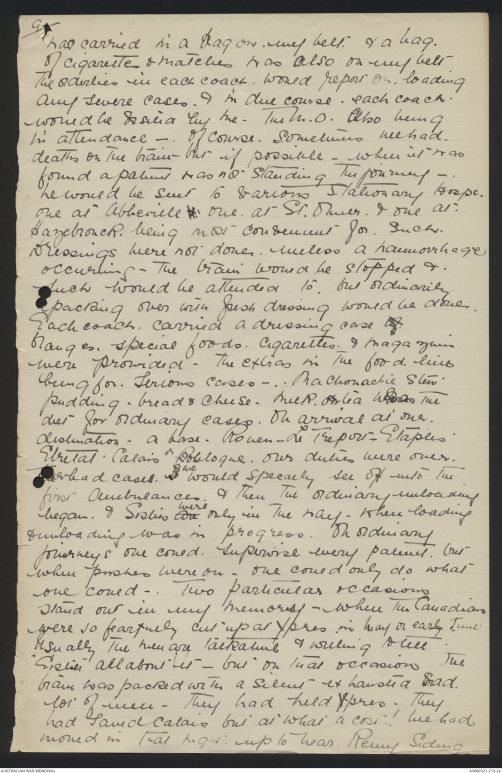
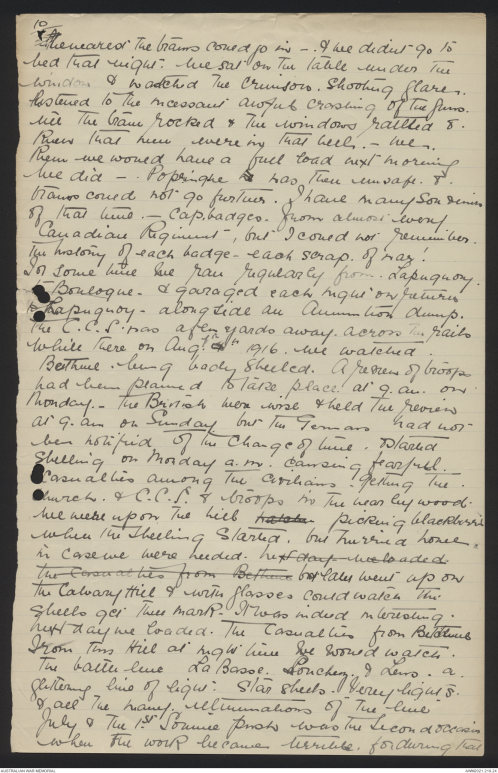
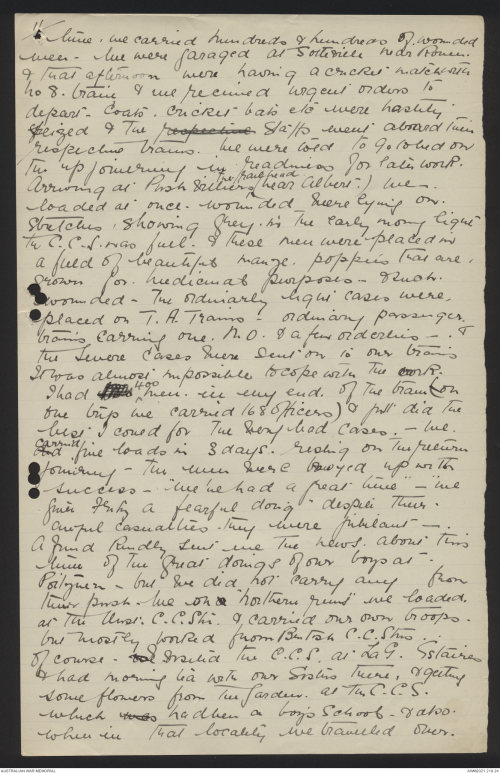
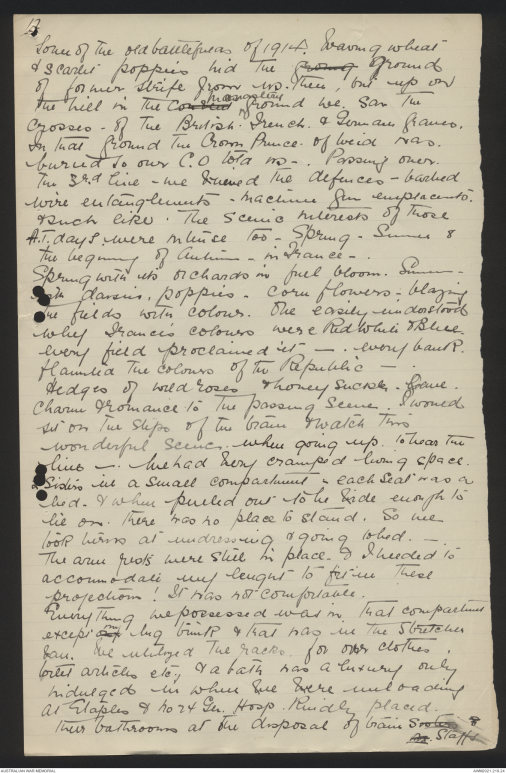
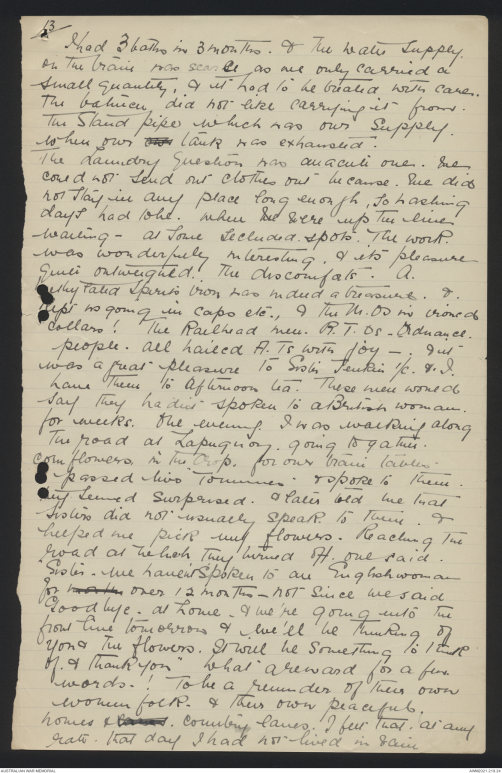
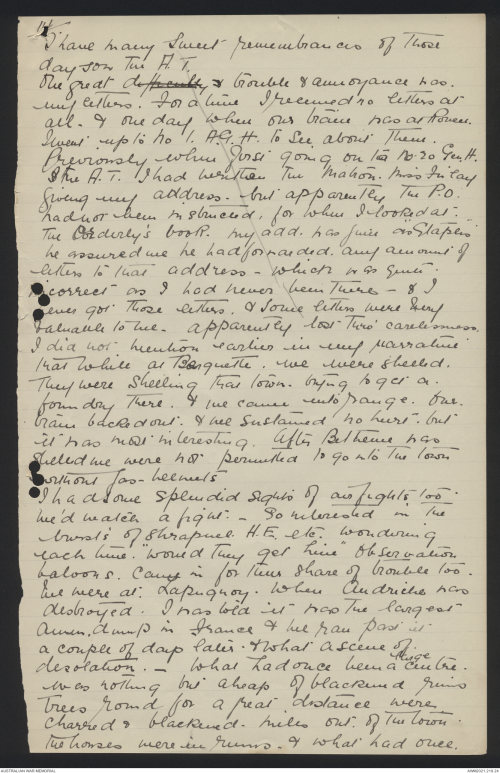
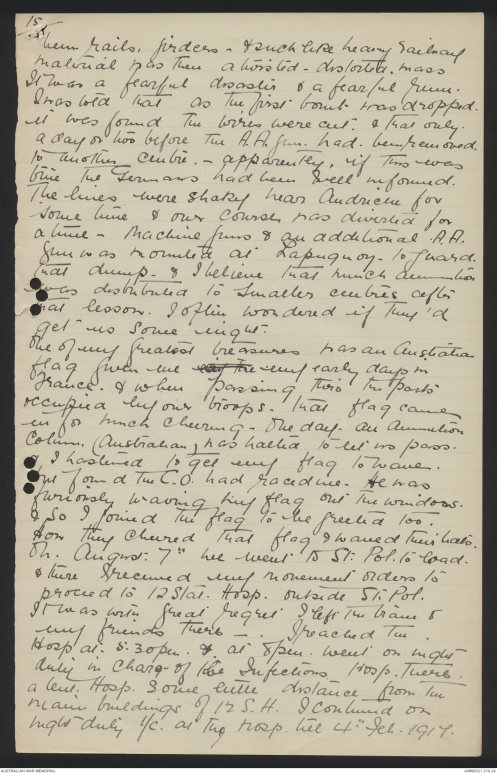
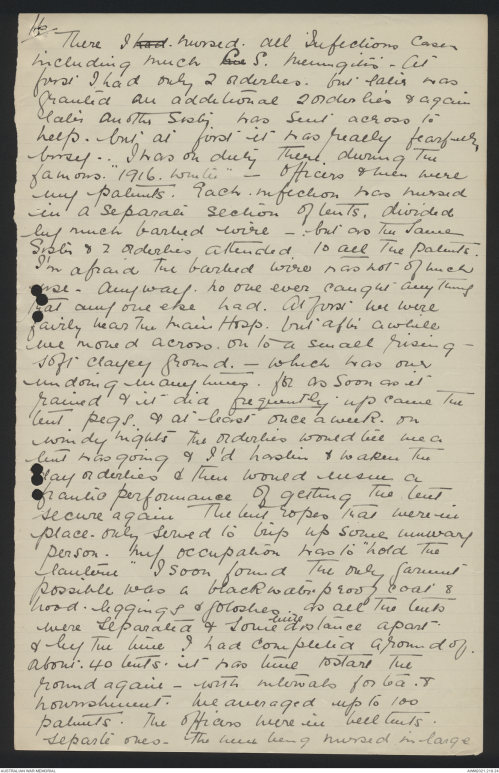
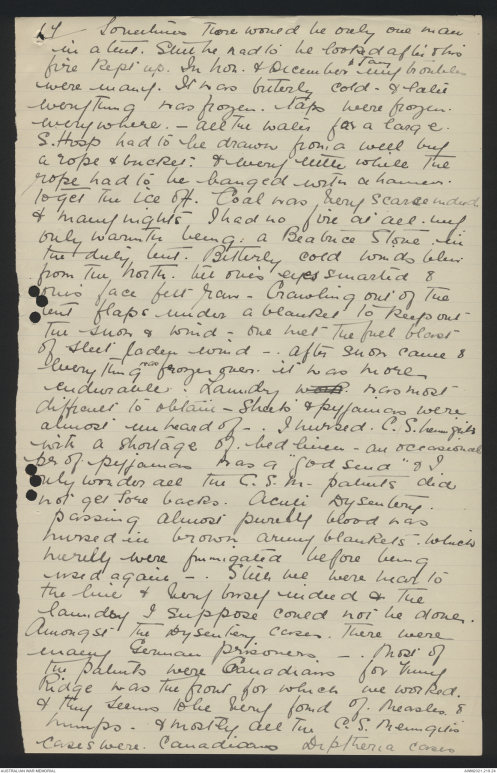
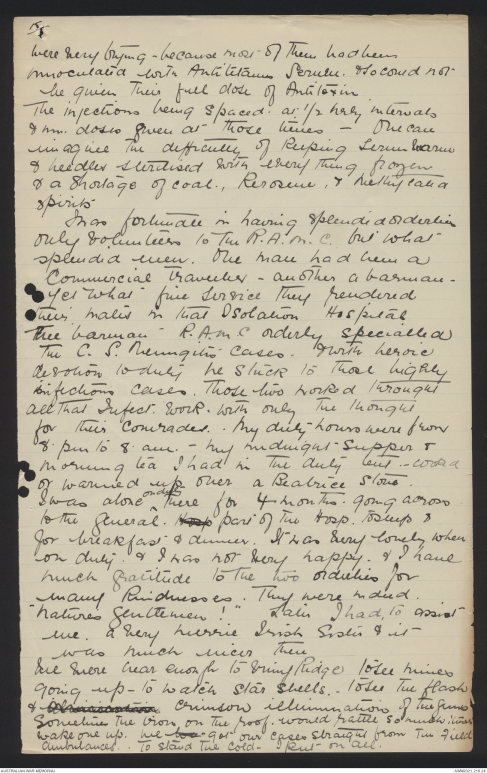
9
was carried in a bag on my belt & a bag.
of cigarettes & matches was also on my belt
The orderlies in each coach, would report on loading
any severe cases. & in due course. each coach
would be visited by me. The M.O. Also being
in attendance – of course. Sometimes we had
deaths on the train - but if possible - when it was
found a patient wasnt standing the journey -
he would be sent to various Stationary Hosps.
one at Abbeville x one at St. Omer & one at
Hazebrouck being most convenient for such.
Dressings were not done unless a haemorrhage
occurring - The train would be stopped &
such would be attended to but ordinarily
packing over with fresh dressing would be done.
Each coach carried a dressing case of
oranges, special foods, Cigarettes, & Magazines
were provided - the extras in the food lines
being for serious cases -. Machonachie Stew
pudding, bread & cheese. Milk, or tea was the
diet for ordinary cases. On arrival at our
destination - a base. Rouen-Le Treport-Etaples
Etretat . Calais or Boulogne. our duties were over.
[[The?]] bad cases I we would specially see off into the
first Ambulances. & then the ordinary unloading
began. & Sisters are were only in the way, when loading
& unloading was in progress. On ordinary
journeys one could supervise every patient, but
when pushes were on, one could only do what
one could. Two particular occasions
stand out in my memory - where the Canadians
were so fearfully cut up as Ypres in May or early June
Usually the men are talkative & willing to tell
"Sister" all about it - but on that occasion the
train was packed with a silent exhausted sad
lot of men- they had held Ypres. They
had saved Calais but at what a cost! We had
moved in that night up to near Remy Siding
10
the nearest the trains could go in - & we didn't go to
bed that night. We sat on the table under the
window & watched the crimson shooting flares,
listened to the incessant awful crashing of the guns.
till the train rocked & the windows rattled &
knew that men were in that hell. - We
knew we would have a full load next morning
We did - Poperinghe he was then unsafe &
trains could not go further. I have many souvenirs
of that time - cap badges from almost every
Canadian Regiment, but I could not remember
the history of each badge - each scrap of war!
For some time we ran regularly from Lapuquory
to Boulogne, & garaged each night on return
to Lapuquory- alongside an Ammunition dump.
The C.C.S. was a few yards away, across the rails
while there were on Aug 7th 9th 1916 we watched
Bethune, being badly shelled. A review of troops
had been planned to take place at 9 a.m. on
Monday. The British were wise & held the review
at 9 a.m. on Sunday but the Germans had not
been notified of the change of time, & started
shelling on Monday a.m. causing fearfull
casualties among the civilians getting the
church & C.C.S. & troops in the near by wood.
We were up on the hill watch picking blackberri
when the shelling started, but hurried home
in case we were needed. Next day we loaded
the casualties from Bethune but later went up on
the Calvary Hill & with glasses could watch the
shells get their mark. It was indeed interesting.
Next day we loaded the Casualties from Bethune
From this Hill at night time we would watch.
The battle line La Basse Pouchery & Lews. a
glittering line of light. Star shells. Verey lights
& all the many illuminations of 'the line'
July & the 1st Somme push was the second occasion
when the work became terrible, for during that
11
time we carried hundreds and hundreds of wounded
men. We were garaged at Sotteville near Rouen,
& that afternoon were having a cricket match with
No 8 train & we received urgent orders to
depart. Coats, cricket bats etc were hastily
seized & the respectivestaff went aboard their
respective trains. We were told to go to bed on
the up journey in readiness for later work.
Arriving at Push Villiers ^the railhead (near Albert) we
loaded at once. wounded were lying on
stretches showing grey in the early morning light
the C.C.S. was full & these men were placed in
a field of beautiful maize poppies that are
grown for medicinal purposes. Such
wounded - the ordinarly light cases were
placed on T.A. Trains - ordinary passenger
trains carrying one M.O. & a few orderlies - &
the Severe cases were sent on in our trains
It was almost impossible to cope with the work.
I had xxx ^400 men in my end of the train (on
one trip we carried 168 officers) and just did the
best I could for the very bad cases. - We
did ^carried five loads in 3 days, resting on the return
journey - the men were buoyed up with
success - "We've had a great time" - "We
gave Fritz a fearful doing" despite their
awful casualties, They were jubilant -
A friend kindly sent me the news about this
time of the great doings of our boys at
Poityuen - but we did not carry any from
their push. We on a 'northern runs' we loaded
at the Aust. C.C.Stn. & carried our own troops,
but mostly worked from British C.C.Stns.
of course. We I visited the C.C.S. at LaG Estaires
& had morning tea with our Sisters there, & getting
some flowers from the garden at the C.C.S.
which was had been a boy's school & also
when in that locality we travelled over
12
some of the old battlefields of 1914. Waving wheat
& scarlet poppies hid the groung ground
of former strife from us then, but up on
the hill in the court ^monastery ground we saw the
crosses of the British, French & German graves.
In that ground the Crown Prince of Weid was
buried so our C.O. told us. Passing over
the 3rd line - we viewed the defences - barbed
wire entanglements, machine gun emplacements,
and such like. The scenic interests of those
A.T. days were intense too - Spring & Summer &
the beginning of Autumn in France-
Spring with its orchards in full bloom. Summer
with daisies, poppies, corn flowers blazing
the fields with colour. One easily understood
why France's colours were Red White & Blue.
Every field proclaimed it - every bank
flaunted the colours of the Republic -
Hedges of wild roses & honeysuckle gave
charm & romance to the passing scene. I would
sit on the steps of the train & watch this
wonderful scene when going up to near the
lines - We had very cramped living space.
2 Sisters in a small compartment & each seat was a
bed, & when pulled out to be wide enough to
lie on there was no place to stand. So we
took turns at undressing & going to bed. -
The arm rests were still in place & I needed to
accommodate my length to fit in these
projections! It was not comfortable.
Everything we possessed was in that compartment
except our my big trunk & that was in the stretcher
van. We utilized the racks for our clothes,
toilet articles etc, & a bath was a luxury only
indulged in when we were unloading
at Etaples & No 24 Gen. Hosp. kindly placed
their bathrooms at the disposal of train sisters & Ax staffs
13
I had 3 baths in 3 months & the water supply
on the train was scarce as we only carried a
small quantity, & it had to be treated with care.
The batmen did not like carrying it from
the stand pipes which was our supply
when our our tank was exhausted.
The Laundry Question was an acute one. We
could not send our clothes out because we did
not stay in any place long enough, so washing
days had to be when we were up the line
waiting - at some secluded spots. The work
was wonderfully interesting & its pleasure
quite outweighed the discomforts. A
methylated spirits iron was indeed a treasure &
kept us going in caps etc., & the M.Os in ironed
collars! The Railhead men, R.T.Os - Ordnance
people all hailed A.Ts with joy - & it
was a great pleasure to Sister Jenkin 1/C & I
have them to afternoon tea. These men would
say they hadn't spoken to a British woman
for weeks. One evening I was walking along
the road at Lapuquoy going to gather
cornflowers in the crop for our train tables
passed two 'Tommies' & spoke to them.
They seemed surprised & later told me that
Sisters did not usually speak to them &
helped me pick my flowers. Reaching the
road at which they turned off one said
"Sister, we haven't spoken to an Englishwoman
for months over 12 months - not since we said
Goodbye at home & we're going into the
front line tomorrow & we'll be thinking of
you & the flowers. It will be something to think
of & thank you" What a reward for a few
words! To be a reminder of their own
womenfolk & their own peaceful
homes & lanes country lanes. I feel that at any
rate that day I had not lived in vain.
14
I have many sweet remembrances of those
days on the A.T.
The great difficulty & trouble & annoyance was
my letters. For a time I received no letters at
all & one day when our train was at Rouen
I went up to No 1. A.G.H. to see about them.
Previously when first going on to No 20 Gen. H.
& the A.T. I had written to Matron, Miss Finlay
giving my address, but apparently the P.O.
had not been instructed, for when I looked at
the Orderly's book my add. was just as "Etaples"
he assured me he had forwarded any amount of
letters to that address - which was quite
incorrect as I had never been there - & I
never got those letters & some letters were very
valuable to me. Apparently lost thro' carelessness.
I did not mention earlier in my narrative
that while at Barquette we were shelled.
They were shelling that town trying to get a
foundry there & we came into range. Our
train backed out & we sustained no hurt but
it was most interesting. After Beltheune was
shelled we were not permitted to go into the town
without gas-helmets.
I had some splendid sights of airfights too.
We'd watch a fight - so interested in the
bursts of shrapnel H.E. etc. wondering
each time "would they get him" Observation
baloons came in for their share of trouble too.
We were at Lapuquoy when Audriche was
destroyed. I was told it "was the largest"
ammun. dump in France & we ran past it
a couple of days later & what a scene of
desolation - what had once been a huge centre
was nothing but a heap of blackened ruins
Trees round for a great distance were
charred & blackened. Miles out of the town
the houses were in ruins & what had once
15
been rails, girders, & such like heavy railway
material was then a twisted & distorted mass
It was a fearful disaster & a fearful ruin.
I was told that as the first bomb was dropped
it was found the wires were cut & that only
a day or two before the A.A. guns had been removed
to another centre - apparently, if this was
true the Germans had been well informed.
The lines were shaky near Audriche for
some time & our course was diverted for
a time - machine guns & an additional A.A.
was mounted at Lapuquoy to guard
that dump & I believe that much ammunition
was distributed to smaller centres after
that lesson. I often wondered if they'd
get us some night.
One of my greatest treasures was an Australian
flag given me my the my early days in
France & when passing thro' the posts
occupied by our troops that flag came
in for much cheering. One day an ammunition
column (Australian) was halted to let us pass
& I hastened to get my flag to wave
but found the C.O. had raced me. He was
furiously waving my flag out the windows.
& so I found the flag to be greeted too
& on their cheered that flag & waved their hats.
On August 7th we went to St Pol. to load
and there I received my movement orders to
proceed to 12 Stat. Hosp. outside St. Pol
I was with great regret I left the train &
my friends there -. I reached the
Hosp. at 5.30pm & at 8pm went on night
duty in charge of the Infectious Hosp. there.
a tent Hosp. some little distance from the
main buildings of 12 S.H. I continued on
night duty 1/C at the hosp. til 4th Feb. 1917.
16
There I had nursed all Infectious cases
including much Sxx S. Meningitis. At
first I had only 2 orderlies but later was
granted an additional 2 orderlies & again
later another Sister was sent across to
help but at first it was really fearfully
busy. I was on duty there during the
famous "1916 Winter" - Officers & men were
my patients. Each infection was nursed
in a separate section of tents, divided
by much barbed wire - but as the same
Sister & 2 orderlies attended to all the patients
I'm afraid the barbed wire was not of much
use. Anyway no one ever caught anything
that anyone else had. At first we were
fairly near the Main Hosp. but after a while
we moved across on to a small rising -
soft clayey ground. - which was our
undoing many times, for as soon as it
rained & it did frequently up came the
tent pegs & at least once a week, on
windy nights the orderlies would tell me a
tent was going & I'd hasten & waken the
day orderlies & then would ensue a
frantic performance of getting the tent
secure again. The tent ropes that were in
place only served to trip up some unwary
person. My occupation was to "hold the
lantern" I soon found the only garment
possible was a black water proof coat &
hood, leggings & goloshes, as all the tents
were separated & some ^little distance apart
& by the time I had completed a round of
about 40 tents it was time to start the
round again - with intervals for tea &
nourishment. We averaged up to 100
patients. The officers were in bell tents,
separate ones, then men being nursed in large
17
Sometimes there would be only one man
in a tent. Still he had to be looked after & his
fire kept up. In Nov & December ^& Jan my troubles
were many. It was biterly cold & later
everything was frozen, taps were frozen
everywhere - all the water for a large
S. Hosp had to be drawn from a well by
a rope & bucket & every little while the
rope had to be banged with a hammer
to get the ice off. Coal was very scarce indeed
& many nights I had no fire at all, my
only warmth being a Beatrice Stove in the
duty tent. Bitterly cold winds blew
from the North till one's eyes smarted &
one's face felt raw - Crawling out of the
tent flaps under a blanket to keep out
the snow & wind - one met the full blast
of sleet laden wind - after Sn on came &
everything ^was frozen over it was more
endurable. Laundry work was most
difficult to obtain - sheets & pyjamas were
almost unheard of - I nursed C.S meningitis
with a shortage of bed linen - an occasional
pr of pyjamas was a 'god send' & I
only wonder all the C.S.M. patients did
not get sore backs. Acute dysentery
passing almost purely blood was
nursed in brown army blankets, which
merely were fumigated before being
used again -. Still we were near to
the line & very busy indeed & the
laundry I suppose could not be done.
Amongst the Dysentery cases there were
many German prisoners - most of
the patients were Canadians for Vimy
Ridge was the front for which we worked
& they seems to be very fond of measles &
mumps, & mostly all the C.S. Meningitis
cases were Canadians Diptheria cases
18
were very trying - because most of them had been
innoculated with Anti tetanus serum & so could not
be given their full dose of Antitoxin.
The injections being spaced at 1/2 hrly internals
& mm. doses given at those times - One can
imagine the difficulty of keeping serum warm
& needles sterilised with everything frozen
& a shortage of coal, kerosene & methylated
spirits.
I was fortunate in having splendid orderlies
only volunteers to the R.A.M.C. but what
splendid men. One man had been a
Commercial traveler - another a barman -
yet what fine service they rendered
their mates in that Isolation Hospital.
The barman R.A.M.C. orderly specialled
the C.S. Meningitis cases & with heroic
devotion to duty he stuck to those highly
infectious cases. Those two worked through
all that Infect. work with only the thought
for their comrades. My duty hours were from
8pm to 8am - my midnight supper &
morning tea I had in the duty tent - cooked
or warmed up over a Beatrice stove.
I was alone ^on duty there for 4 months, going across
to the General Hosp part of the Hosp. to sleep &
for breakfast & dinner. It was very lonely when
on duty & I was not very happy & I have
much gratitude to the two orderlies for
many kindnesses. They were indeed
'Natures Gentlemen!' Later I had to assist
me a very merrie Irish Sister & it
was much nicer then.
We were near enough to Vimy Ridge to see mines
going up - to watch star shells - to see the flash
& illumination crimson illuminations of the guns
Sometimes the iron on the roof would rattle so much it
wake one up. We xx got our cases straight from the Field
Ambulance. To stand the cold, I put on all
 Sandy Mudie
Sandy MudieThis transcription item is now locked to you for editing. To release the lock either Save your changes or Cancel.
This lock will be automatically released after 60 minutes of inactivity.